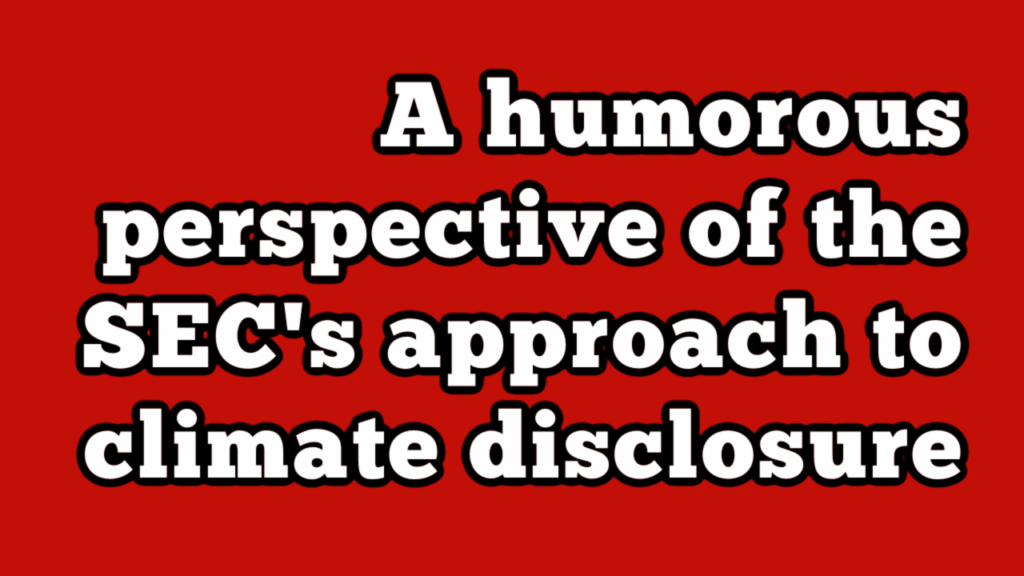A humorous perspective of the SEC’s approach to climate disclosure

– Argues there’s no doubt that for global standards to be effective, they must have US input and support, even leadership.
– But they must also have a far more rigorous requirement for truth-telling than the current US system requires.
This blog by Claire Bodanis of “Trust me, I’m listed” is pretty humorous. Here is an excerpt:
So why am I cheering, albeit cautiously, the US Securities and Exchange Commission (SEC), and what’s it got to do with developments in ESG reporting? Last week I listened in to the International Institute of Finance’s US Climate Finance Summit (once I’d battled through their arcane registration system – now there’s a body that needs a tech revolution). I was particularly keen to hear the ‘New frontiers in Climate and ESG Disclosure’ panel discussion with John Coates of the SEC and Janine Guillot of the Sustainability Accounting Standards Board (SASB), of which I’ve long been a fan.
Initially alarmed by John’s opening, which staked the SEC’s claim to leading the development of a consistent, global set of standards for ESG reporting, I decided to hold my prejudices in check for the 30 minutes required of the session and actually listen to what he had to say before furiously bashing the comment button.
And in listening I heard some reassuring words: ‘continued, thoughtful engagement by trusted specialists looking for consensus about what’s useful’, and (music to my ears) ‘balancing principles and metrics’ in a debate about ‘how much industry standardisation can be achieved’. This was in the context of the 2020 modification by the SEC of regulation S-K, which, the facilitator mentioned, took requirements beyond the financial.
My ears pricked up – S-K? What’s that? Not wanting to miss a second of the discussion, a quick google gave me the answer (thank you legal eagles Jones Day): ‘The amended Regulation S-K rules reflect a shift toward a more principles-based disclosure framework and expand certain disclosure requirements relating to, among other things, human capital resources and government regulations.’
Goodness, I thought, am I going to have to amend my pro-UK, anti-US regulatory regime rhetoric?
Perhaps not quite yet, since John went on to say: ‘There are two common mistakes that people make about disclosure. We don’t currently have a rule that says you must disclose everything that is material.’ In picking my jaw up off the carpet, I’m afraid I missed the second mistake, but I managed to pull myself together quickly enough to take in a very important nuance in this debate, highlighted by Janine.
ESG – voluntary or mandatory? asked the facilitator. Not so fast, Janine replied; mandatory, like green, comes in many shades, and can mean everything from a principles-based, comply or explain type approach, to specific metrics for specific topics. John swore he and Janine hadn’t colluded beforehand, but his comment was very similar – noting, for example, that it is mandatory in the US for voluntary disclosures not to mislead the market (another slightly jaw-dropping moment there). And, he added, it is at this interplay between the voluntary and the mandatory where regulatory bodies such as the SEC can help.
I was also pleased to hear that, in promoting the SEC as a body that could lead in shaping a new ESG reporting regime, John echoed Janine’s message that such a regime must be global to meet the needs of global companies. That it must be allow ‘ample room for jurisdictional variation’. (To which I’d add Janine’s point, which SASB has been making for years, that any regime must allow for industry sector variation too, because non-financial metrics are not directly comparable or equally relevant to all companies in the way that in general, financial ones are.) And finally, he echoed, that any regime must be built through consensus, because the challenges inherent in such a project are numerous and contentious.
And this excerpt is Claire’s bottom-line:
Back to the SEC, and I was delighted by John’s overarching comment that any policy or approach from the SEC will ‘respect science, evidence, and reality’. It’s just a shame that he felt it necessary to say so. There’s no doubt that for global standards to be effective, they must have US input and support, even leadership. But they must also have a far greater and more rigorous requirement for truth-telling than the current US system requires.
Truth-telling that is intelligible to all stakeholders, not just those professionals who know their way around a 300-page, densely packed, gobbledegook Form 10K or 20-F. And that’s why I give the SEC’s proposed leadership role a cautious, single cheer, but not quite an all-out hat trick just yet – although I am encouraged by the SEC’s changes to the S-K, and its reference to principles, because it suggests better things to come.
